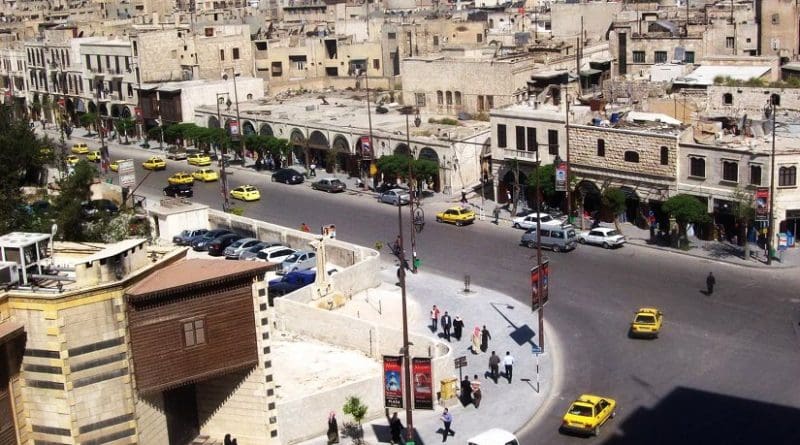What Now For Christians In Syria And Iraq?
By CNA
By Elise Harris and Kevin Jones
War in Iraq and Syria have taken a heavy toll on the Chaldean Christians of the Middle East. Now Chaldean bishops like Archbishop Bashar Warda of Erbil, Iraq are asking what they can do to help Christian refugees survive and preserve their faith in times of trouble.
“For me, my plan is how to help the Christian families who decided to stay, to stay and live with dignity. That’s my big concern, the whole plan,” Archbishop Warda told CNA Oct. 28.
“To be honest, I cannot tell anyone to stay. There are hundreds of reasons which encourage people to leave. There is no one reason to really urge and help them to stay. But we hope and we have faith that this community would stay, and, please God, be strengthened by the prayers that we’ve receiving,” he said.
Archbishop Warda was one of the bishops at the Chaldean Catholic bishops’ synod, which took place in Rome Oct. 24-29.
The Chaldean Catholic Church’s patriarchal see is Babylon, based in present-day Baghdad. The Church has a presence in Iran, Syria, Lebanon, Turkey, Israel and Egypt, as well as in France and the U.S. There are over 400,000 Chaldean Catholics around the world, according to the Catholic Near East Welfare Association.
Violence in Iraq after the 2003 U.S. invasion and the rise of the Islamic State group in Iraq and Syria has resulted in the targeted killings and expulsions of many Christians. The brutal conflict has caused millions of people, including hundreds of thousands of Christians, to flee their homes.
Many have fled to Jordan, Lebanon and Turkey, while others are displaced within their home countries. Displaced Iraqi Chaldeans have tended to move to Erbil and Dohuk.
The pressures to emigrate abroad are enormous, the archbishop said. “Today if you offer a visa to all the refugees they will take it,” he explained. “But we know that some of them would leave with tears.”
“Not everyone would like to leave, because during the time when there was a possibility to go they preferred to stay.”
The Chaldean bishop in Lebanon is “doing his best” to care for the refugees and to convince them to stay in the Middle East.
Iraqi Christians who remain in the Middle East would be more likely to return to their homes in the Nineveh Plains and Mosul, Archbishop Warda said. “But once they leave the Middle East it would be the end of the story.”
The Chaldean Church does not want to force families to stay, he noted. Rather, the Church wants “just to be with them, and even help them with the material needs and spiritual and pastoral needs they want in this difficult time.”
“Everything is changing, but still, we would like to respond to the immediate needs of the refugees, which is shelter, health, education and other material issues,” the archbishop said, pointing to the bishops’ work with different Catholic aid agencies.
The Chaldean bishops are working with displaced bishops, clergy, and religious sisters from Mosul to ensure spiritual and pastoral care for their flock.
Archbishop Warda’s home city of Erbil, in the Kurdistan region of northern Iraq, is a safe region, though it shares a 650 mile-long border with territory controlled by the Islamic State group.
“The welcoming attitude of the Kurdish government was really a big help which was given to the Christian refugees, and Yazidis,” the archbishop said.
“We have in Kurdistan some 1,800,000 refugees,” he added.
The diocese itself is hosting 10,300 Christian families who left Mosul and the Nineveh Plain. But some 3,000 Christian families left since 2014.
The archbishop said it would be “very hard” to go back to Mosul. Even if it were to be freed from the Islamic State, “we need some time.”
“But to the Nineveh Plains and its villages, yes, people would really like to go back and rebuild life. It would be difficult, it is not really be an easy choice. The commitment and risk is high, especially when you have this kind of broken trust between the communities, but I think the mission of the Church and all Christians is to stay and build bridges. We’ve done it before, I think we will be able to do it again.”
He said dialogue with the Islamic State is not possible because “they would not imagine themselves in any position of dialogue.”
“We are infidels to them,” he said.
Rather, he suggested Christians could engage with other victims of the Islamic State group and “try to build bridges of peace and trust.”
At the Chaldean bishops’ synod, one group of bishops focused on the practical issues facing internally displaced persons and refugees. These issues include knowing their location, their needs and priorities, ways to help, and how to contact hem.
The archbishop said there has been “an increase in the needs” of these people.
A second bishops’ group at the synod focused on issues related to culture and identity. These include questions such as how to welcome the refugees and help them keep their identity, and also “the issue of homeland.”
The Chaldean bishops’ synod also discussed liturgical questions. Two-thirds of the Chaldean community is outside of Iraq. Second generation immigrants speak English, French, German, or Swedish.
This creates liturgical issues of language, translation, and official texts – issues which also bear on morning and evening prayer. The Chaldean bishops typically hold a synod every year. They have decided to dedicate a future synod to the Chaldean liturgy.

